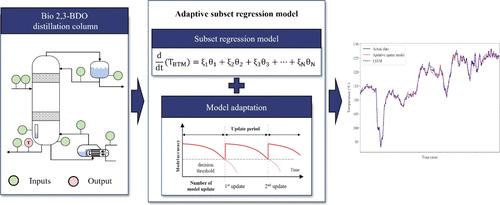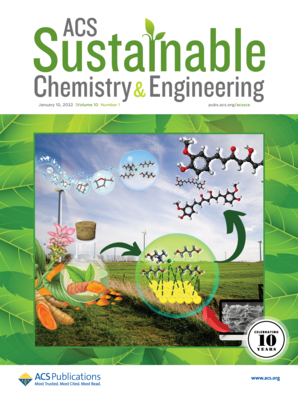基于机器学习的自适应回归,识别生化系统的非线性动态:生物 2,3-丁二醇蒸馏过程案例研究
IF 7.3
1区 化学
Q1 CHEMISTRY, MULTIDISCIPLINARY
引用次数: 0
摘要
开发精确的流程模型对于高效运行流程并最大限度地提高其经济效益至关重要。虽然利用历史数据的离线数据驱动模型通常表现出令人满意的性能,但在准确预测以随时间不断变化和不确定性为特征的实际流程时,其效果会大打折扣。因此,我们需要一种能够有效处理动态行为的自适应模型。在本研究中,我们提出了一种利用子集选择技术和决策阈值的自适应数据驱动回归模型。此外,考虑到模型准确性的统计指标以及更新次数、更新周期和计算时间等非统计指标,我们还对不同模型参数和训练窗口大小的案例研究进行了综合分析,以确定最佳自适应回归模型。所开发的自适应回归模型已在大韩民国 GS Caltex 公司的生物 2,3-丁二醇蒸馏塔上成功演示,这表明该模型可能适用于类似的工艺系统,并为未来工艺优化和控制方面的研究提供了机会。本文章由计算机程序翻译,如有差异,请以英文原文为准。

Machine Learning-Based Adaptive Regression to Identify Nonlinear Dynamics of Biochemical Systems: A Case Study on Bio 2,3-Butanediol Distillation Process
Developing an accurate process model is essential to efficiently operate a process and maximize its economics. While offline data-driven models utilizing historical data generally exhibit satisfactory performance, their effectiveness diminishes in accurately predicting real processes characterized by constant changes and uncertainties over time. Hence, there is a need for an adaptive model that is capable of effectively handling dynamic behavior. In this study, we propose an adaptive data-driven regression model that leverages subset selection techniques and decision thresholds. In addition, a comprehensive analysis was performed to determine the best adaptive regression model, considering case studies with different model parameters and training window sizes, taking into account statistical indicators of model accuracy as well as nonstatistical indicators such as the number of updates, update period, and computation time. The developed adaptive regression model has been successfully demonstrated on a bio 2,3-Butanediol distillation column at GS Caltex, Republic of Korea, suggesting its potential applicability to similar process systems and providing opportunities for future research in process optimization and control.
求助全文
通过发布文献求助,成功后即可免费获取论文全文。
去求助
来源期刊

ACS Sustainable Chemistry & Engineering
CHEMISTRY, MULTIDISCIPLINARY-ENGINEERING, CHEMICAL
CiteScore
13.80
自引率
4.80%
发文量
1470
审稿时长
1.7 months
期刊介绍:
ACS Sustainable Chemistry & Engineering is a prestigious weekly peer-reviewed scientific journal published by the American Chemical Society. Dedicated to advancing the principles of green chemistry and green engineering, it covers a wide array of research topics including green chemistry, green engineering, biomass, alternative energy, and life cycle assessment.
The journal welcomes submissions in various formats, including Letters, Articles, Features, and Perspectives (Reviews), that address the challenges of sustainability in the chemical enterprise and contribute to the advancement of sustainable practices. Join us in shaping the future of sustainable chemistry and engineering.
 求助内容:
求助内容: 应助结果提醒方式:
应助结果提醒方式:


